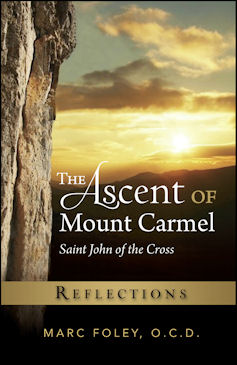
|
Posted September 10, 2014
Book: The Ascent of Mount Carmel: Saint John of the Cross -- Reflections Author: Marc Foley, O.C.D. ICS Publications, Washington, DC. 2014. Pp. 238 An Excerpt from the Jacket:
Saint John of the Cross, revered as one of Christianity's greatest poets and mystics, is nevertheless often intimidating to those who want to read his works. His subject matter and writing style, coupled with his use of Scholastic terminology, make his contemplative prayer and practice, difficult to understand. And although our era is witnessing a growing interest in contemplative prayer and practice, many suspect that this 16th-century Carmelite is just too demanding and harsh to appeal to ordinary Christians. With the Ascent of Mount Carmel: Reflections, Father Marc Foley shares his seasoned wisdom, gleaned from years of reading and teaching John of the Cross, with contemporary spiritual seekers. He deftly weaves together insights from psychology, theology, and great literature to make The Ascent of Mount Carmel both understandable and relevant to daily life. An Excerpt from the Book: John puts before us a vicious cycle. When our minds ruminate over an event, the images and emotions that thinking generates are stored in the memory. Because these memories are emotionally charged, they are easily triggered to the conscious mind. . . To use John's language, when "the memory focuses on (revuelve)" what the will desires, we keep the past alive. Revuelve, derived from revolver, means to turn over in one's mind or to retrace. The more we chew upon the past, the greater the intensity of emotion that clings to and contaminates our soul. . . Resentment lingers in the soul because it sounds like the voice of reason and justice, sweet with the morose pleasure of self-pity. Over time, the emotion no longer clings to us; we cling to it. Table of Contents: Book One Appetite and appetites Discontentment Denial of gratification Harms The threshold of consent To exit is to enter Counsel one: growing in habitual desire Counsel two: renouncing sensory satisfaction Counsel three: having contempt for self Counsel four: to have all, renounce all The fatal pause The sweet breast of God Book Two The withdrawal of consolation The passive night of sense The transition from discursive meditation to contemplation By their fruits you will know them The obscure certainty of faith The voice of faith and the voice of reason Like trying to explain color to a blind man Visions and revelations Just talking The atmosphere we create The wisdom of the community Book Three The memory Do not store up memory The hair trigger of memory The stomach of the mind Tranquility of soul Supernatural knowledge in the memory Remembrance of things past The will Joy in temporal goods Joy in natural goods Joy in sensory goods Joy in moral goods Joy in supernatural goods Joy in spiritual goods Conclusion |
|
